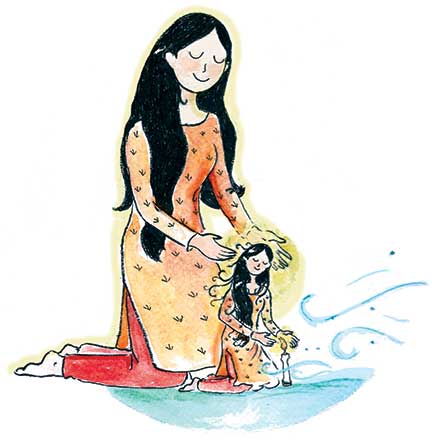Lakshmi Karunakaran
I feel I am racing against time on most days. There are multiple tasks to finish, and I know when I finish them there will be more on the list. Don’t get me wrong, I love my work. It is exciting, I find joy when I am with my students. They fill me with hope and positivity. Yet, there is stress to the work that I do. I notice that lately I become angry quickly. I am snappy. I regret it later. I fall into a cycle of guilt. I know my energy levels are fast depleting. I feel the settling of pain in my back at the end of every day. I know I need to slow down and take a break. Sometimes my body says that, sometimes my friends do. Taking a break, I know will only further add to my task list, and hence my stress. I don’t want to abandon my work. Maybe I don’t know how to take a break anymore. What will I do when I take a break? Think and worry about work again?
Does this sound familiar to you? It does to me. I heard this from an educator friend recently and I knew much of what she was articulating I was experiencing as well. To compound to it, I work with vulnerable children and communities. I find myself worrying about them, their problems, and the trauma they experience affects me. I do sometimes struggle to protect myself, without becoming apathetic.
Many teachers and educators who focus on social emotional learning for their students, and/or are in the practice of being emotional mentors or guides often forget to take care of themselves. This is directly linked to more instances of burn out, stress and attrition in the teacher community. Building long term self-care solutions and practices might seem very tough but are essential in the long run.
Secondary trauma and compassion fatigue
During the Vietnam War in 1960, a young psychologist and first respondent named Charles Figley noticed something unusual was happening within him. As wounded soldiers were coming off the battlefield and sharing stories of horror and trauma that they were experiencing, he noticed something was changing within him too. He didn’t understand it, because he thought he knew, as a professional, how to protect himself. But he soon started to feel less safe, he started to question his values, and his quality of life started to deteriorate. That’s when he realized that he was taking the pain and suffering of the wounded soldiers and making it his own. He was experiencing Secondary Traumatic Stress Syndrome. Exploring this became his life’s work and in 1995 he coined the word Compassion Fatigue.
According to Figley, Compassion Fatigue is a state experienced by those helping people or animals in distress; it is an extreme state of tension and preoccupation with the suffering of those being helped to the degree that it can create a secondary traumatic stress for the helper.
Patricia Smith, founder of the Compassion Fatigue Awareness Project says, “Working with individuals who have experienced a traumatic event can make someone more susceptible to secondary traumatic stress. In other words, if you’re working with kids who are coping with trauma, there’s a chance it could affect you too. That’s why it’s so important to take care of yourself – a healthy teacher is a more effective teacher.”
 What is self-care?
What is self-care?
Susannah Joy Winters, HypnoBirthing Educator from the Unites States says, “Self-care is deliberately taking care of your wellbeing through restorative activities.” The key word here is “deliberate”. A human mind processes over sixty thousand thoughts in a day, and if you are stressed, about eighty per cent of them are negative. The key to self-care then is to deliberately build practices that can help create awareness about your body and your mind, help navigate these thoughts and feelings with awareness. It is to watch out for yourself.
How do I build a self-care practice?
Self-care practices may include setting healthy boundaries, knowing when and how to detach with love and care, positive self-affirmations, and building a peer support network – all of this may not be essential for your teaching practice, but are crucial for your own mental, emotional and physical health.
Shabari Rao, a dance maker, educator and researcher from Bangalore, India has taken a break from her regular teaching practice recently. “After 18 years of practice, I felt I needed to pause, to look at myself, protect myself. It’s been a few months since I stopped teaching regularly. Like a field is burnt down after a harvest, for new life to sprout, I see this break as a space to delve deeper into myself, to discover a new self. I am trying to simplify life. And I am realizing sometimes doing less, is doing a lot more.”
It is common for many educators/social workers, or care givers in general to be in constant saviour mode. We feel that when we are busy, we are important, we are needed, we are being useful to others, we are being appreciated. “We may be stuck in saviour mode – it’s important to recognize it. Knowing our boundaries, and stepping back sometimes becomes equally important. It is our job to protect ourselves,” says Sabari.
Susannah’s self-care practice includes eating healthy, practicing moments of stillness, including movement and exercise and spending time in nature. These practices help her manage her anxieties and help her keep her mind and body healthy.
In our frenzy to become responsive, giving and nurturing teachers and educators, I hope we don’t forget to protect ourselves from a burn out. Remember the famous practical quote with a massive metaphorical meaning: “Secure your own oxygen mask first before assisting children.”
The author is an arts based educator from Bangalore. She can be reached at lakshmikarunakaran@gmail.com.
